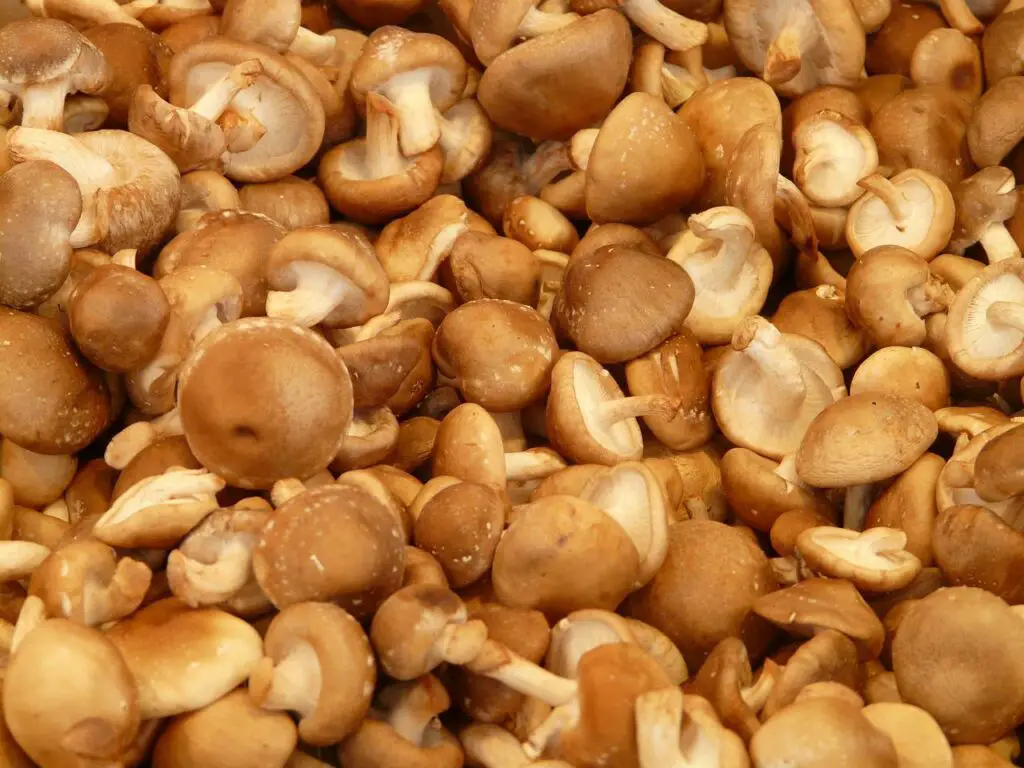Dogs, like humans, are omnivorous, which means they can eat meat and plant-based foods to supplement their diet.
When it comes to supplementing your furry friends’ diet, few plant-based alternatives are as nutrient-packed as mushrooms.
Can dogs eat Shiitake mushrooms?
Yes.
Dogs can eat Shiitake mushrooms because these are among the few edible types of mushrooms.
Shiitake mushrooms are known for their antifungal, antibacterial, and antiviral properties thanks to their nutrient-rich composition..
If you’re still not sure whether to feed your canine Shiitake mushrooms, below are reasons why you may want to add it to their diet.

Reasons to Feed Your Dogs Shiitake Mushrooms
Before listing the benefits of adding Shiitake mushrooms to your dog’s diet, it’s essential to understand why you should feed this nutritious fungus to your pooch.
Yes, contrary to popular belief, mushrooms are a fungus.
Shiitake mushrooms trace their origin to Japan where they were revered as a medicinal elixir.
They boast a rich, savory and meaty taste, making them ideal for dogs.
However, it’s their diverse health benefits that make Shiitake mushrooms popular.
Generally, mushrooms pack a punch compared to other foods when it comes to their nutrient content.
They’re packed with vitamins A & B, riboflavin, iron, manganese, folate, magnesium, enzymes, copper, selenium, potassium, niacin, zinc, thiamin and pantothenic acid.
Similarly, they have a high fiber and protein content, making them one of the best non-meat superfoods for dogs.
Without further ado, let’s get into the benefits of feeding mushrooms to your dogs.

Improves Digestion
Mushrooms are known for their high fiber content, a key ingredient for improved digestion.
As a result, feeding your dog Shiitake mushrooms boost their health by improving bowel movements.
Additionally, the good bacteria in a canine’s stomach digest the fiber to produce fatty acids, which prevent the growth of dangerous bacteria in the dog’s digestive system.
All these benefits maintain a healthy digestive system, which in turn boosts the canine’s immunity.
Improves Calcium and Phosphorus Absorption
Calcium and phosphorus are critical to a dog’s physiology.
So, it’s essential that they have the capacity to absorb these minerals in the right amounts at all times.
Otherwise, a dog that’s unable to ingest Calcium and Phosphorous in appropriate amounts may suffer from:
- Heart disease
- Some cancers
- Autoimmune disorders
- Diabetes
For dogs to absorb adequate amounts of Calcium and Phosphorus, they need a healthy dose of vitamin D.
No plant food has a higher vitamin D content than mushrooms, especially one’s grown under sufficient sunlight.
The only other foods that have a higher vitamin D content are animal-based and include meat, eggs, fowl and fish.
Feeding your dog Shiitake mushrooms boost the absorption of the two minerals.
Most importantly, it supplements the body with other cofactors that improve general nutrient and mineral absorption.
Boosts Cardiac Health
Generally, many canine diets feature a high-fat content.
Unfortunately, most of the animal-based fats dogs consume are detrimental to the cardiovascular system.
Shiitake mushrooms are a great alternative for canine parents who want to feed their dogs fatty foods without impacting their heart health negatively.
Shiitake mushrooms have plenty of omega-6 essential fatty acids in the form of linoleic acid.
Not only is this fat the healthy type, but it’s also essential for heart health.
These mushrooms have a low sodium content, reducing the chances of dogs developing hypertension or heart failure.
But perhaps the best heart health benefit of Shiitake mushrooms is their ability to lower cholesterol production in your pooch.
The mushrooms have beta-glucans and eritadenine which lower and inhibit cholesterol production, respectively.
Lower Effects and Chances of Cancer
Cancer is a detrimental disease for both dogs and humans.
While there’s no way of preventing the disease entirely, feeding your dogs Shiitake mushrooms might prevent or slow down cancerous cells if your dog already has the disease.
Shiitake mushrooms have loads of lentinan, a sugar molecule that has been subjected to intense research.
While lentinan does not eliminate cancer cells directly, research shows it boosts the immune system in ways that lower how fast a tumor grows.
These mushrooms have mycochemicals that research shows are responsible for killing cancer cells – apoptosis.
Mychochemicals also have antioxidant properties, which prevent many other chronic diseases.
These and many more cancer-suppressing abilities make Shiitake mushrooms one of the best foods you can add to your dog’s diet.
Improve Weight Loss and Control
Like humans, overweight dogs have a higher risk of contracting a host of weight-based disorders like heart disease and high blood pressure.
While feeding your dog green beans may also help control their weight, the legumes are not as nutritious as Shiitake mushrooms.
Unlike many other plant foods, mushrooms have a high beta-glucan content, a soluble dietary fiber.
As a result, dogs that eat mushrooms experience increased satiety as the absorption of the fibers slows down nutrient absorption and reduces food intake.
According to research animals fed on Shiitake mushrooms are likely to lower their body weight gain by 35%.
Boosts Coat and Skin Health
Every pet parent wants their furry friends’ coats and skin to be lush and healthy.
Shiitake mushrooms have a trace element, Selenium, that improves the look, feel, and condition of your canine’s coat.
The element is also essential in hormonal balance and improved immune function.
Similarly, it improves joint health and may reduce the impacts of cancer on your dog.
The mushrooms’ high zinc content is also beneficial for skin health.
How to Prepare Shiitake Mushrooms for Dogs
How you prepare Shiitake mushrooms for your dogs will depend on which form the mushrooms are in – fresh, dried or powdered.
Cook fresh mushrooms in a skillet with a little oil on medium heat for 8 to 10 minutes until they’re tender and golden brown.
As they cook, toss and turn them occasionally for even cooking.
On the other hand, dried Shiitake mushrooms should be rehydrated first before heating them.
While it’s important not to overcook them, mushrooms are one of the few foods that rarely lose their nutrient content after cooking.
However, the best method to prepare mushrooms for your dog is to roast them as they retain more nutrients.
Once the mushrooms are cooked through, cut them up or blend them and mix them into your dog’s regular food.
Alternatively, buy powdered Shiitake and add it to your dog’s food as needed.
It’s easier than the two methods above and potentially provides more nutrients in powder form.
Just ensure the powder you buy is made from whole mushrooms.
How Often Should Dogs Eat Shiitake Mushrooms?
You can feed your dogs Shiitake mushrooms every day.
However, you have to do it in moderation.
Shiitake mushrooms are jam-packed with vitamins, which can be harmful to dogs.
Research shows that when dogs consume large doses of specific vitamins, they may experience bouts of irritability, vomiting, peeling of the skin, and drowsiness on short notice.
Mushrooms should only be used as supplements, not the main mail.
Therefore, to ensure you don’t endanger your dog, keep their daily Shiitake mushroom intake at about 3 to 4 small pieces.
If you’re feeding them powdered Shiitake, feed them a maximum of 2 tablespoons a day.
Are Shiitake Mushrooms Poisonous for Dogs?
No.
Shiitake mushrooms are not poisonous to dogs.
However, raw or undercooked Shiitake mushrooms may not poison your dog, they may trigger a reaction that causes severe itching.
So, it’s essential that you feed your dog cooked mushrooms only.
Should your dog ingest raw Shiitake mushrooms unexpectedly and start showing signs of an allergic reaction, contact your vet immediately and find out what’s the best cause of action.
- What Dog Breeds Have Pink Skin? - March 24, 2023
- What Are the Most Inspiring Dog Breeding Quotes? - March 20, 2023
- Can Pheromone Spray Help Improve Dog Breeding Results? - March 19, 2023








